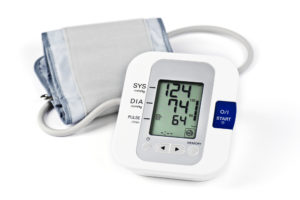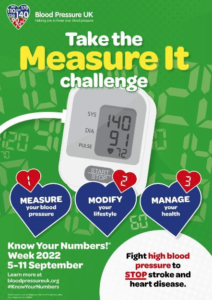Blood Pressure Awareness Week 5-11 September 2022
 Know your numbers: Getting accurate blood pressure readings and taking action could save your life
Know your numbers: Getting accurate blood pressure readings and taking action could save your life
Those of you with an upper limb difference will be only too aware of the barriers in getting an accurate blood pressure, (BP) reading, be that from taking your blood pressure from your thigh or ankle, or to the right sized cuff being available to take a reliable reading. Some health professionals may not be confident or used to taking blood pressure readings in the leg.
 National Blood Pressure Awareness week is taking place from 5-11 September
National Blood Pressure Awareness week is taking place from 5-11 September
The theme this year is Measure, Modify, Manage. Find out more from Blood Pressure UK.
Measure your blood pressure to see if it’s under control.
Modify your lifestyle if necessary.
Manage your blood pressure and your health to beat ‘the silent killer’.
Why is an accurate blood pressure reading so important?
When your blood pressure is too high there is extra strain put on your organs such as kidneys, eyes, and brain, as well as on your blood vessels and heart.
If this goes untreated over a period of time there can be an increase to your risk of potentially life-threatening conditions such as heart disease and heart attack, stroke and vascular dementia.
What does my blood pressure reading actually measure?
Blood pressure refers to the pressure of the blood in the blood vessels as it is pumped around your body. Blood pressure readings are normally given as two numbers: one number over another, for example, 128 over 88 or 128/88. The first or top number is called the systolic blood pressure and relates to the pressure in your blood vessels when the heart contracts or pumps blood out and around your body. The second or bottom number is called the ‘diastolic blood pressure’ and refers to the blood pressure in your blood vessels when your heart relaxes and fills with the blood.
Both these measurements are taken in millimeters of mercury or mmHg.
Your blood pressure is considered high if it is 140/90 mmHg or above.
Taking your BP if you have a limb difference – is the reading accurate - what does it mean?
The Trust are conducting research to understand the relationship between the blood pressure reading in the arm and that taken in the leg. The blood pressure in your leg is different to the pressure in your arm but will still give an indication of whether your blood pressure is normal or raised. Your doctor will be able to interpret the readings for you.
If you wish to get an idea of what the blood pressure in your arm would be, take 15 off the top reading. This is an approximate guide only.
What raises my blood pressure?
Lifestyle factors that can increase your risk of developing high blood pressure.
You could be at higher risk if you:
- Are overweight
- Do not eat enough fruit and vegetables
- Each too much salt in processed foods
- Drink too much alcohol or coffee
- Smoke
- Have disturbed sleep
- Have a close family member with high blood pressure
What does the NHS provide?
The NHS health check is offered to all eligible adults between the ages of 40 – 74 every five years. You should have been offered one by your GP surgery. If you have not have not yet had one you can ask your GP practice. The check includes lifestyle risk factors such as diet, physical activity, smoking and alcohol, and physical risk factors like high blood pressure, blood sugar and cholesterol.
What is the Trust doing to help?
This has been an important area of research for the Trust for some time in part because we know some of you are using your leg to take your blood pressure and have difficulty having blood taken for routine checks to look at your risk of heart disease and stroke.
You may be already aware of our work with The Royal National Orthopaedic Hospital to look at how a blood pressure in the leg compares to that taken in the arm as we have asked you to let us know if you are having surgery. This study is designed to understand how accurate blood pressure measured in the leg and recruits beneficiaries who are undergoing surgery. It compares the blood pressure in your artery (the most accurate measure) and your blood pressure in your leg when they are taken at the same time. We have also been comparing blood pressure readings taken in the arm and leg in people who do not have thalidomide damage.
If you would like to take part in this study, you can find out more here.
We are also in contact with other research teams to see how else we can help, for example, researchers at the University of Exeter and University of Oxford. In addition we link very closely with communities abroad affected by thalidomide to know what research they are undertaking.
Getting a diagnosis
Your GP or practice nurse are the best people to see if you have concerns over your blood pressure. They can measure your blood pressure in the practice. They also may encourage you to take readings at home and they can review them.
The Trust has some resources about how to take the blood pressure in the leg, including a video. You can share these with your GP practice.
What do I do if my blood pressure is raised?
If you have high blood pressure you can reduce it to a safer level via lifestyle changes or medication. It is best to speak to your GP or a Trust medical adviser to find out what's best for you. If you do need medication, your GP may want to choose one that doesn’t involve regular blood tests. Please speak to one of the medical advisers at the Trust about this.
Some changes you can make in your lifestyle to help reduce your blood pressure
- Eat a healthy diet and reduce the amount of proceeded food you consume
Learn about the Mediterranean diet - Losing weight if you are carrying extra pounds
See our guidance on how to lose weight heathily - Taking up a regular exercise routine
If you would like to increase your daily activity levels to help reduce your blood pressure we have beneficiary Activity Buddies ready to work with you. They’ll help you uncover what activities you enjoy doing and help you gradually increase your activity levels. You’ll be able to check in with them, discuss any barriers and start to see the benefits of increasing your activity levels.
Find out more about our Activity Buddies and how to request their support - Cutting down on caffeine to one or two cups a day
- Reducing your alcohol intake
Learn how to reduce your drinking - Stop smoking
If you would to discuss a plan to stop smoking and get support please get in touch with a medical advisor.
Beneficiary David successfully gave up smoking using a variety of methods - you can read his story here.
What else can cause high blood pressure?
In some cases high blood pressure is a result of an underlying health condition although this is rare. Causes of high blood pressure can be problems with your kidneys, or an issue with the glands that sit on top of the kidney, the adrenal glands or with some tumours that release hormones.
Some medications can also be linked to high blood pressure, such as steroids. You can discuss this with your GP if you are concerned.
Remember, high blood pressure often does not have any symptoms so you need to have your blood pressure checked. Those aged over 40 are advised to have their BP checked at least once every 5 years. If you are at an increased risk it is a good idea to checked yearly.
Knowing what your blood pressure is and taking action if your level is high could save your life!
